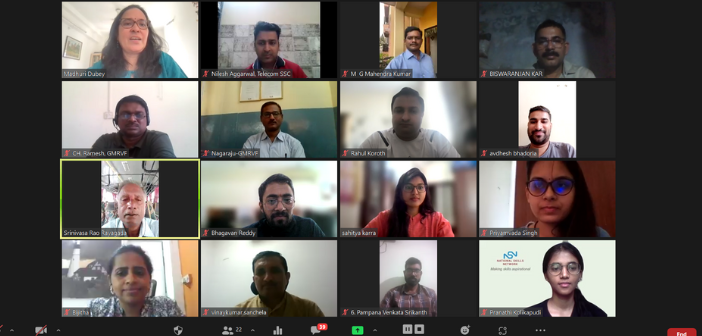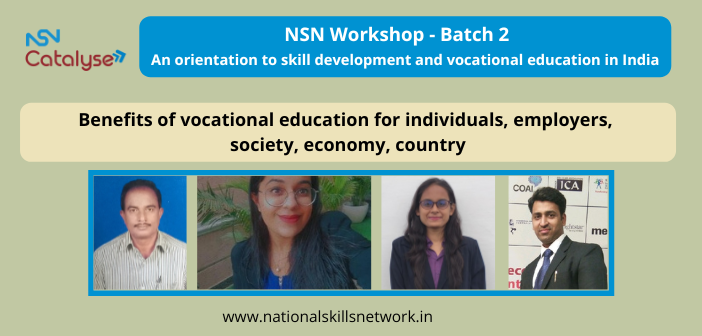The second batch of the online interactive workshop on “An orientation to skill development and vocational education in India” saw enthusiastic participation with stimulating discussions. The workshop held on 23rd April 2022, focused on understanding the skilling and education ecosystem and ways to increase the youth employability. The interaction also involved discussions on initiatives taken by the government to strengthen vocational education in India.
Out of 25 who registered for the workshop, 19 members attended and actively participated in the pre-workshop activities as well. The deliberations also led to some learnings that can be taken up by various industries to upskill and reskill the individuals.
 After the workshop, we wanted to know the views of participants on improving vocational education. They shared their views on the benefits of vocational education for the individual, employers, society, economy and country.
After the workshop, we wanted to know the views of participants on improving vocational education. They shared their views on the benefits of vocational education for the individual, employers, society, economy and country.
Apart from mainstream education, vocational education provides an individual with the right skillsets for the right kind of jobs in the industry. Vocational education helps an individual in any trade they are interested in and train them to get a job in that specific trade. It also gives hands-on experience along with theoretical knowledge for an individual to understand the trade better. Vocational education guarantees an increased rate of youth employability.
Let’s look at the responses shared by a few of the participants in this regard –
R Srinivasa Rao, Program Officer, GMR Varalakshmi Foundation, Vizianagaram
1. Individuals
Vocational education benefits every individual who is pursuing it seriously. Some of them are as follows:
- The individual can become ready to use the workforce for industries.
- The individual will get the work and earning opportunities easily within a short time.
2. Employers
Vocational education benefits Employers who engage vocational candidates in their establishments.
- The equality and productivity will be good.
- Availability of a better Skilled workforce for much cheaper wages compared to a highly paid senior non-technical workforce.
3. Society
Vocational education benefits the Society as well. Some of them are as given below:
- As the individual pass-outs of Vocational education, became self-sustainable, the Society will also become self-reliant.
- The possibility of diverting the unemployed youth into Terrorism, Naxalism and anti-social elements, will come down.
4. Economy
Vocational education considerably benefits the economy. Some of the prominent benefits are as mentioned here.
- The Indian skilled workforce will get a good number of overseas work opportunities and thus increase foreign exchange.
- The increased quality and productivity will induce healthy opportunistic growth in the GDP of the nation.
5. Country
Vocational education benefits the country as most of the parameters of sustainable development goals will show good improvement. Some of them are as given below:
- Poverty in the country will be decreased
- Decent work and economic growth
- Good health and well-being
- Industry, Innovation and Infrastructure
Priyamvada Singh, Assistant Manager, Agriculture Sector Skill Council (ASSC)
1. Individual
Vocational education provides the individual with an opportunity to explore the career path and job roles required in the industry as per the current demand especially when he/she could not complete his/her formal education or degree program. The individual can start at the entry level and consequently move up the career ladder by upgrading the current skill level through vocational training irrespective of whether he/she has previously completed the degree or not. It focuses on the practical skills that impart job readiness to the individual through fieldwork and on-the-job training which makes him/her capable of adapting to the changing corporate world.
2. Employers
The job market is continuously changing and advancing. Gone are those days when an individual can spend the entire life in just one job role. The elements of skilling, re-skilling and upskilling in the vocational education keep the employees in pace with the new trends and best industry practices. This consequently benefits the employers as the time spent on training and the expenditure incurred on the training gets substantially reduced. Besides, the employers get the industry-ready employees with enhanced efficiency and productivity.
3. Society
Vocational education enables the individual to become self-employed and makes them capable of undertaking self-employment too. This in turn provides the livelihood to a major portion of the society through employment generation while also contributing effectively to the required workforce in the given sector.
4. Economy
Vocational education results in wage employment for the unemployed, increased wages for the employed and better profits for the self-employed. Hence, it plays an important role in poverty alleviation through skill development, creating a talent pool and human capital which consequently contributes to economic growth and industrialization.
5. Country
Vocational education eradicates the shortage of skilled manpower for the industry, increases labour productivity through enhanced and relevant skillset, contributes to the economic growth and enables the better implementation of innovation. All these factors consequently add up to take the country on the road to development and better tomorrow.
 Nilesh Aggarwal, Senior Manager, Telecom Sector Skill Council (TSSC)
Nilesh Aggarwal, Senior Manager, Telecom Sector Skill Council (TSSC)
1. Employers
Employers will be happier to get trained and certified candidates under Skill India programs for their organization as they require manpower from time to time.
“I would like to say that if a candidate is certified in any vocational course, then in this case a company don’t need to train him further in that trade because he knows his job better practically so it will save time.”
The company’s productivity will also be improved if the work is done by such candidates also the work will be done at a high speed.
2. Society
Our society will have no issues with not getting a job after vocational education is completed. We will be more into job givers, not job seekers. Recently, the Delhi government has started a program where candidates will get a certain amount from them to start the small work of their choice.
3. Economy
Students entering vocational programs also experience various economic benefits by choosing this educational path. When students graduate from a vocational program, they have work experience and specific training for their exact field. In other words, their prospective employer knows that this candidate has gone through specialized learning, and practice in the field and is prepared to start in the new position right away with minimal training. There is no doubt that India’s economy will be high and amp; will be developed on a global scale. Now, India is in a strong position to provide skilled labour whereas the rest of the world is forecast to experience a skill shortage.
4. Country
In terms of employment of our youth after having any vocational qualification, India will be in the top position in coming years. The world becomes increasingly globalized with each passing year. The internet connects businesses and customers instantaneously, which helps break down barriers between people of different backgrounds. Students graduate with intimate experience of working cross-culturally, a better understanding of communicating with people from different backgrounds, and the insight they need to thrive in jobs worldwide. In other words, they become assets to their organizations in the globalized world.
Also Read: Workshop learnings and outcomes: Skill development and vocational education in India https://nationalskillsnetwork.in/workshop-learnings-and-outcomes-skill-development-and-vocational-education-in-india/
Shubhangi Sethi, Management Trainee, Telecom Sector Skill Council (TSSC)
Shubhangi Sethi, Management Trainee, Telecom Sector Skill Council (TSSC) shared her views on the pros and cons of Vocational Educational and Training.
Advantages of Vocational Educational Training:
- Vocational Education focuses on practical skills.
- Students are more prepared to begin their jobs immediately.
- This is an education that prepares students for the global stage.
- Helps in building better relationships with classmates and professors.
- Awakens passions in minds of students.
- Students in vocational jobs enter their career paths because they have the chance to pursue their passion or a career that interests them.
- It includes Adaptable Programs
- Vocational courses are intended to support non-conventional students who wish to study while balancing other obligations.
Economic benefits of vocational education
- Candidates often have an easier time finding a job.
- Students can often finish school faster.
- Schools in the vocational sector often cost less than other types of learning institutions.
Challenges faced by vocational education
- It has less of an opportunity to explore different subjects
- In a traditional academic school program, students have opportunities to explore different subjects and disciplines outside their core topics for their future degrees.
- Some organizations have encountered struggles when it comes to adapting to students who were educated in primarily vocational studies.
The second workshop was made successful by the participants by active responses during the session. The activities have created opportunities for people to participate in and discuss initiatives to improve skilling and vocational education.













